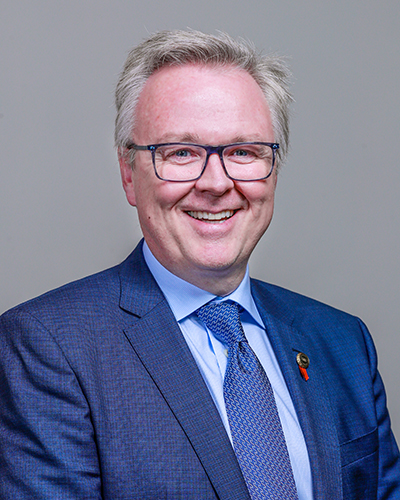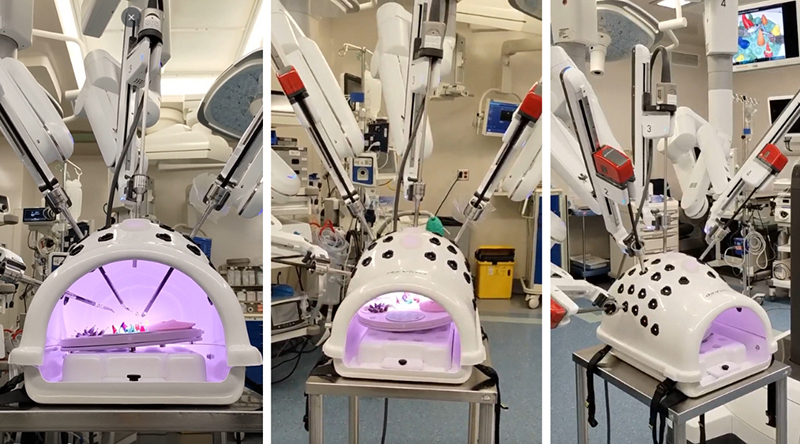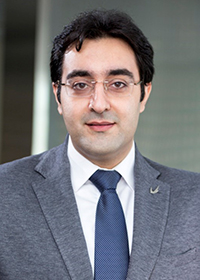Robotic surgery in the spotlight
Did you know that the first surgical robot was developed and operated in Canada in 1984? Since then, robotic surgery has taken a gigantic leap forward, propelled by advances in electronics and computer science. Where are we now in Quebec, and where are we heading in this field? This is the theme of the 2024 edition of INNOVE-ACTION, an annual event that brings together researchers, healthcare professionals, industrial partners, decision-makers and managers working to reinvent healthcare. Dr. Simon Tanguay, Chief Urologist at the McGill University Health Centre (MUHC), will participate as a guest speaker.
“There are many advantages to using robotic surgery: it increases the precision of operations, can improve recovery time for patients, and enables interventions that would not otherwise be possible. For example, through certain studies, we realized that in the field of urology in Canada, university centres that had implemented robotic surgery were performing more kidney surgeries where the kidney was preserved rather than completely removed,” says Dr. Tanguay.

Dr. Simon Tanguay, Chief Urologist at the MUHC
One of the biggest advances in the field has been the development of the Da Vinci robot, which enables surgeons to manipulate surgical tools. Its multiple arms serve as a physical extension, enabling them to act with greater precision. The MUHC has two of these robots, which are used primarily for urology, gynecology, ENT, thoracic surgery, colorectal surgery and more.

Robot Da Vinci at the Montreal General Hospital, credit: Montreal General Hospital Foundation
A day to reflect on robotic surgery
This year, INNOVE-ACTION will take place on October 29. The MUHC will join forces with the CHUM and six other healthcare institutions.
“This new edition offers healthcare professionals from a variety of backgrounds the opportunity to reflect on and discuss advances, challenges and opportunities in the field of robotic surgery and their implementation in Quebec,” explains Dr. Tanguay, who is also a member of the event's scientific and organizing committee.
Implementing robotic surgery in Quebec is not that simple. “In Quebec, one of the main challenges is that we are limited in our ability to acquire more robots, for financial reasons. The cost of a surgical robot is particularly high, and most of them are acquired through philanthropic efforts, explains Dr. Tanguay. However, more companies are developing robots, and this will undeniably help drive down costs and increase accessibility to robotic surgery.”
“This event is an opportunity to reinforce the message that this kind of surgery is important and deserves investment. Robotic surgery is not going to disappear; on the contrary, it is set to grow,” he says.
The future of robotic surgery at the RI-MUHC
The MUHC is committed to finding solutions for the future, and is actively developing the next generation of surgical robots. The SuPER (Surgical Performance Enhancement and Robotics) laboratory is the research and innovation centre for surgical performance, artificial intelligence and next-generation surgical robotics research. Located at the Montreal General Hospital, the laboratory is part of the Research Institute of the McGill University Health Centre (RI-MUHC) and the Department of Surgery at McGill University. Directed by Dr. Amir Hooshiar, Assistant Professor of Surgery and a scientist in the Surgical and Interventional Sciences Program at the RI-MUHC, the laboratory is home to a dynamic team of 16 active researchers and trainees working on cutting-edge projects. This strategic initiative is part of the “Future of Surgery” initiative of Dr. Liane Feldman, Surgeon-in-Chief and Director of the Department of Surgery. This 10-year plan is based on perfecting safer, more personalized surgical techniques to enhance each individual's recovery.

Dr. Amir Hooshiar, Assistant Professor of Surgery and a scientist in the Surgical and Interventional Sciences Program at the RI-MUHC
Since its creation in 2021, the laboratory has established multiple active collaborations with industrial partners and enabled the creation of six “startups”. SuPER's research focuses on improving surgical outcomes through robotics and AI, with applications in a variety of medical specialties, including ENT, cardiac surgery, laparoscopy, orthopedics, ophthalmology, and neurosurgery. This collaborative and innovative environment advances precision surgery and patient care.
$25 surgical robots
One of these projects involves the development of miniature robots modulated by artificial intelligence, which could perform procedures right inside a patient.
“Our robots are designed for one-off use and cost around $25 per piece, whereas robots like the Da Vinci cost millions of dollars. In addition to reducing costs, this project will improve precision and enable unprecedented interventions,” explains Dr. Hooshiar.
“The first generation of surgical robots was a physical extension of surgeons' capabilities. The next generation, powered by AI, is a cognitive extension that increases accuracy and reduces errors.”
The acquisition of Da Vinci robots at the MUHC, the creation of the SuPER laboratory and the pursuit of its activities were made possible thanks to the support of the Montreal General Hospital Foundation.
Interested in robotic surgery? Click here to find out more about the October 29, 2024, event: https://www.chumontreal.qc.ca/innovation/evenements-innovation/innove-action

